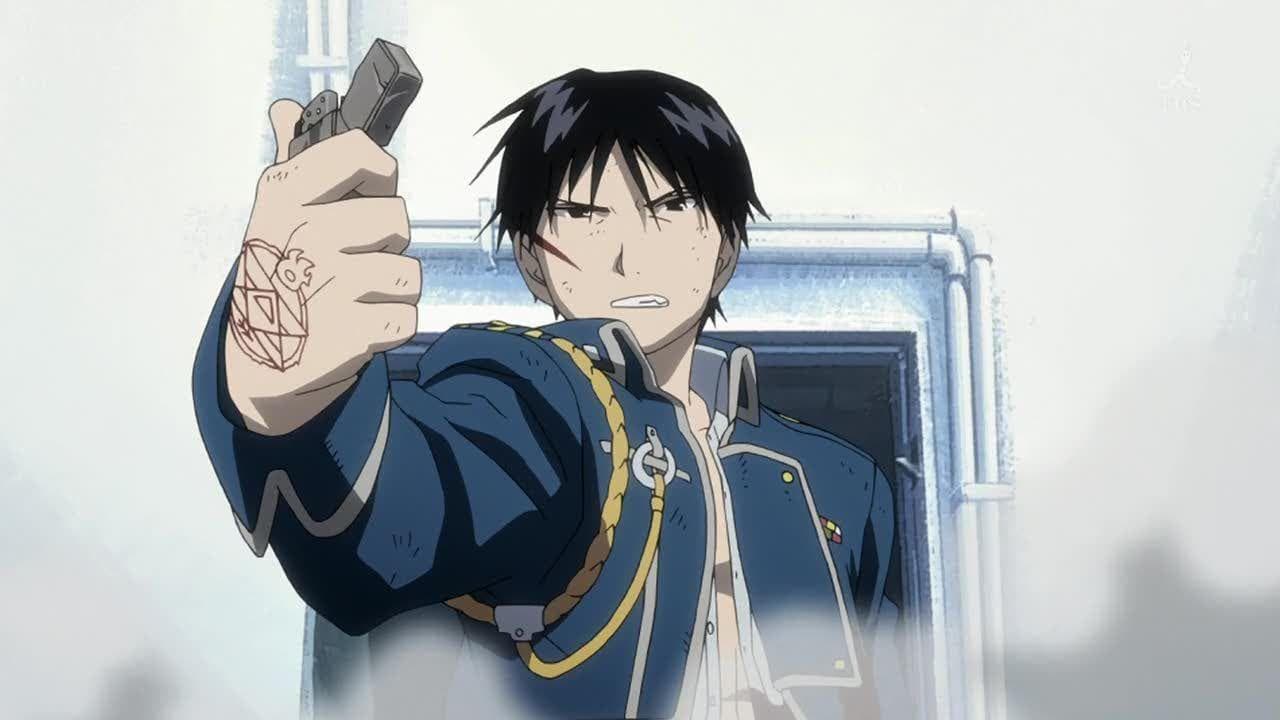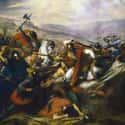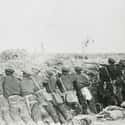-
(#8) Battle of Boyacá
Many historical battles involve feats of individual brilliance and bravery, the kind that military scholars study for generations. Other battles are significant more because of their larger context in geopolitics. The Battle of Boyacá Bridge was both memorable and crucial to the history of South America.
By the time of the battle, Venezuelan revolutionary Simón Bolívar had been fighting to liberate the Spanish-held colonies of South America for nine years, with temporary success. He had liberated and lost Venezuela twice, and in 1815 Spain sent its strongest commander to quell the revolt. Finally, in 1819, Bolivar set out from his capital in Angostura, (now Ciudad Bolívar in Venezuela), with a few thousand soldiers, hoping to take Bogotá, the capital of New Grenada (now Colombia).
Bolívar's plan was as reckless as it was daring. His men first had to march through the plains during the rainy season, which meant walking through flooded areas for days at a time. But that was nothing compared with the next phase: climbing the Andes mountains, where high altitudes create fatally frigid temperatures. Bolívar and his men managed to complete this treacherous and exhausting journey and take the royalist Spanish forces by surprise at the Boyacá Bridge, defeating an evenly sized force. Bolívar immediately declared New Grenada the independent Republic of Colombia, with himself as president and military dictator.
The victory at Boyacá Bridge gave Bolívar and his revolutionaries a foothold to continue the fight for independence. In 1825, Spanish rule in South America ended, and the continent was broken up into several new republics. Bolívar spent his remaining years attempting to unite these nations, which led to civil war and strife. His dream of a single, consolidated South American republic - a counterpoint to the United States in the North - never materialized.
-
(#12) Battle of Red Cliffs
At the beginning of the second century C.E., China had mostly been ruled by a series of dynasties that controlled the nation via a centralized bureaucracy. But that changed following the Battle of Red Cliffs, a turning point in Chinese history.
At this point, the Han Dynasty had ruled China for about 400 years. But for decades, the Hans had allowed their government to fall under the influence of court eunuchs, which led to corruption and instability. This sparked the Yellow Turban Rebellion in 184 C.E., a popular uprising that forced Han leadership to rely on powerful generals to restore order. But empowering these generals allowed them to become autonomous and establish their own fiefdoms. In 195 C.E., the Han Emperor Xian nominally ruled northern China, but he was effectively a puppet of the powerful warlord, Cao Cao.
In 208 C.E., Cao Cao had consolidated his hold on most of northern China and decided to march south to unify the nation once again. He had amassed an enormous army. He claimed it was 800,000 strong, but it was most likely about 250,000 - still huge for the time, and enough to dwarf the combined forces of a coalition of southern warlords led by Liu Bei and Sun Quan. Victory seemed guaranteed. But in order to win, Cao Cao needed to control the strategically important Yangtze River, and most of his troops were inexperienced in naval warfare.
The armies met at the port city of Jiangling, and Cao Cao won the first several skirmishes. But then, a southern commander named Huang Gai came up with a ruse: he would pretend to surrender his fleet to Cao Cao and, once his ships were close enough, set them on fire and crash them into Cao Cao's fleet. Cao Cao fell for it, his fleet was destroyed, and he retreated to his northern stronghold.
Cao Cao's retreat brought about the Three Kingdoms period, a time of intra-national warfare and instability not seen since the Warring States period centuries earlier. China would remain a divided nation for 60 years, until the Jin Dynasty finally brought the nation under its control.
-
(#1) Battle of Tours
In the Seventh century C.E., the Umayyad dynasty expanded from Syria and established a Muslim caliphate covering most of the Middle East, Turkey, and North Africa. And at the beginning of the eighth century, the Umayyads set their sights on mainland Europe.
An unstable political situation allowed the Umayyads to establish a foothold in Spain. In 710 C.E., Witiza, king of Gothic Spain, died and set off a succession dispute. Rather than support Witiza's heir, Akhila, the Gothic nobles elected Roderick, Duke of Baetica, to be their ruler. Akhila's supporters reached out to the Umayyad ruler for assistance, and the Umayyads helped them defeat Roderick. But they refused to return to Morocco and controlled most of the Iberian peninsula by 712.
As the Umayyads began to venture eastward into modern-day France, this brought them into conflict with the Frankish kingdom, which was ruled by the Merovingian dynasty. In 732 C.E., Abd al-Raḥmān al-Ghafiqi and his Umayyad army sacked Bourdeaux. Shortly after that, the Umayyads met the Frankish army led by its de facto ruler Charles Martel. The clash came to be called the Battle of Tours.
Today, the exact location of the Battle of Tours is unknown, as is what exactly happened. We know that Charles defeated al-Raḥmān, with either a decisive cavalry charge or a heavy infantry attack. In strategic terms, the Frankish victory stopped the Umayyad advance.
To be sure, losing the Battle of Tours wasn't the only reason the Umayyads stopped advancing - there were also internal political divisions that undermined the effort - but it did represent the furthest expansion by a Muslim army into Christian territory. If the Battle of Tours had gone differently, it's possible that Islam would be the dominant religion in at least some of Europe today.
-
(#7) Battle of Yangxia
Most of the battles on this list were decisive because they allowed the winning side to achieve their political goals. The Battle of Yangxia is different. Even though the Qing dynasty technically won the battle, they lost the war in the ensuing negotiations.
In 1911, the ruling Qing dynasty had been in steady decline for centuries, thanks to recurring food shortages and a willingness to allow foreign countries to establish markets within China. So when they decided to nationalize the country's railroads and give control to foreign banks, it sparked the 1911 Revolution, the goal of which was to overthrow Qing rule and establish a Chinese republic. The revolutionaries, led by Sun Yat-sen, were poorly armed and trained compared to the Qing military, but they captured the cities of Hankou and Hanyang. This inspired more to join the effort.
The Qing dynasty and its 6-year-old emperor Puyi were forced to turn to General Yuan Shikai for their rescue. Yuan had formed the powerful Beiyang Army, China's first Western-style armed force, and had become one of the most influential figures in the Chinese government. But Yuan's growing power concerned Qing officials, and following the passing of the dowager Empress Cixi, Yuan was forced into retirement. Now, however, the Beiyang Army was Qings' only hope of suppressing the rebellion. Yuan was put in command of the Qing forces and ordered to retake the cities.
During the ensuing 41-day Battle of Yangxia, Yuan did retake Hankou and Hanyang. But the resistance from the revolutionaries inspired more provinces to declare independence from the Qing dynasty. Realizing the revolution was far from suppressed, and that if he did suppress it his usefulness to the Qing dynasty would end, the ambitious Yuan agreed to a ceasefire and entered negotiations with the revolutionaries.
Rather than assert Qing rule, Yuan instead agreed to allow Sun Yat-sen and the revolutionaries to establish the Republic of China - with Yuan as its president. In exchange, Puyi was forced to formally abdicate the throne. Dynastic rule in China had ended after 2,000 years. But the fragile and unstable Republic of China would itself last for only about three decades before it too fell to the Communist Revolution, with an assist from Japan's ruthless invasion of the 1930s.
-
(#11) Battle of Zama
- Military Conflict
The Carthaginian commander Hannibal is still remembered as one of the most brilliant military strategists of all time, and his accomplishments during the Second Punic War are still admired today: he guided an army that included war elephants over the treacherous Alps so he could launch a devastating surprise attack on Northern Italy; he terrorized the Romans in their own territory for over a decade; and at the Battle of Cannae in 216 BCE, he encircled and slaughtered the Roman army. This defeat shocked and humbled the Romans, who considered themselves the Mediterranean's dominant military power.
But as impressive as Hannibal's victories were, the Carthaginians still lost the war. The truly decisive battle of the Second Punic War was the Roman victory at Zama. In the years following Cannae, the Romans had struggled to stop Hannibal on their own soil. So the Roman general Publius Cornelius Scipio gave Hannibal a taste of his own medicine, launching a surprise invasion on the Carthaginian homeland in 203 BCE. This forced Hannibal to withdraw his entire army from Europe to defend Carthage. Crucially, Hannibal couldn't bring his cavalry horses back to Carthage, and he had to slaughter them. Meanwhile, the Romans formed an alliance with the Numidian king Masinissa, who commanded a powerful cavalry force of his own.
Hannibal arrived with an army about the same size as Scipio's, about 40,000 strong. But lacking adequate cavalry and the ability to chose the site of the battle, Hannibal's fortunes were reversed. Scipio spread out his formation to neutralize the effect of Hannibal's war elephants, and the Roman forces and their Numidian allies destroyed most of the Hannibal's army. Hannibal lost Carthage, and the Romans went on to establish an empire.
-
(#2) Battle of Plataea
Even before the movie 300, the Battle of Thermopylae was by far the most famous battle from the wars between Greece and Persia in the fifth century BCE. But in this case, "most famous" doesn't mean "most important." King Leonidas's brave stand against a numerically superior King Xerxes definitely inspired the ancient Greek world, but it didn't significantly slow the Persian advance. Shortly after Thermopylae, Xerxes sacked Athens and established a presence in Greek territory. (Also, Leonidas had quite a few more soldiers under his command than just the 300. It was more like 7,000.)
The real decisive battle in the Persian wars was at Plataea. Soon after defeating the Spartans at Thermopylae, Xerxes suffered a major loss at the naval Battle of Salamis and retreated to Persia. But he left behind a large army led by his general Mardonius, who, according to Herodotus, had goaded Xerxes into attempting the invasion in the first place.
By 479 BCE, the Persians had set up their base in the Greek city of Plataea. That spring, a combined army of Greek city-states that included Sparta and Athens marched to Plataea to confront them.
The Greek army was only about 40,000 men strong, compared with a Persian army that numbered as many as 120,000. (As with all ancient army sizes, these numbers can only be estimated.) But even though the Greeks were outnumbered, they were much better at close-quarters fighting than the Persians, who preferred long-ranged attacks using archers and cavalry. During the battle, disarray in the Greek lines enticed Mardonius to attack, which proved to be a fatal mistake. A Greek counter-attack trapped the over-confident Persians, and the well-trained Greek hoplites routed the Persian formation. Mardonius lost his life in the battle, and Xerxes was never able to mount a serious challenge to Greece again.
New Random Displays Display All By Ranking
About This Tool
There have been many tragic wars unprecedented in human history, and many important wars have profoundly changed the pattern of the world. When it comes to the turning point of modern society, we have all learned some knowledge about World War II and modern world history in history classes. From the perspective of social development, some countries may have won the battle, but they have not won the war.
On many occasions in history, battles have been decisive for participating countries. The random tool introduced 12 important battles in history that changed the course of our lives today, but few people know these historical events.
Our data comes from Ranker, If you want to participate in the ranking of items displayed on this page, please click here.
















